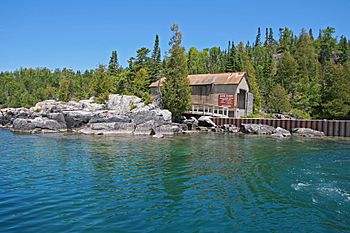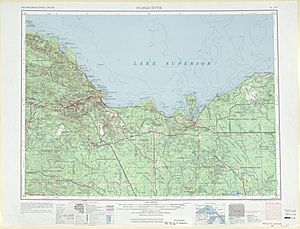Huron Islands facts for kids

Approaching Huron National Wildlife Refuge from the water
|
|
| Geography | |
|---|---|
| Location | Lake Superior |
| Coordinates | 46°57′24″N 87°58′45″W / 46.95667°N 87.97917°W |
| Total islands | 8 |
| Administration | |
| State | Michigan |
| County | Marquette County |
| Township | Powell Township |
| Demographics | |
| Population | Uninhabited |
| Additional information | |
| Official website | Huron National Wildlife Refuge |
The Huron Islands are a group of eight small, rocky islands found in Lake Superior. They are located about 3 miles (4.8 km) away from the mouth of the Huron River in northwestern Marquette County, Michigan, United States. These islands are special because they form the Huron National Wildlife Refuge. This refuge was created in 1905 by President Theodore Roosevelt to protect the wildlife living there.
The Huron Islands area is also known as the Huron Islands Wilderness. It is part of a larger system managed by the Seney National Wildlife Refuge. The waters around the islands are also important. They are part of the Huron Islands unit of the Marquette Underwater Preserve. This means that several old shipwrecks can be found underwater here, which divers can explore!
Exploring the Huron Islands
Most of the Huron Islands are closed to visitors to protect the animals and plants. However, one island, known as Lighthouse Island or West Huron Island, is open to the public. You can only reach this island by private boat, and it's meant for day visits. This island is home to the historic Huron Island Light, which is a lighthouse built way back in 1868. The lighthouse still works today, but it's now fully automated, meaning machines run it instead of people.
Walking on Lighthouse Island
If you visit Lighthouse Island, you'll find a walking path. This path starts where boats usually land on the south side of the island. It leads you all the way to the lighthouse. The path then continues past the lighthouse, taking you to other structures and rocky cliffs on the far north end of the island. The whole path is just over half a mile (0.8 km) long. The part of the path from the lighthouse to the north end can be a bit wild and sometimes has a lot of overgrown plants.
Wildlife on the Islands
The larger Huron Islands have some trees, mostly pine and birch. The smaller islands are mostly bare granite rocks. These rocky spots are perfect for a large group of herring gulls to live and raise their young. You might also spot Bald eagles nesting here, which is very exciting! The refuge helps protect these important bird habitats.



